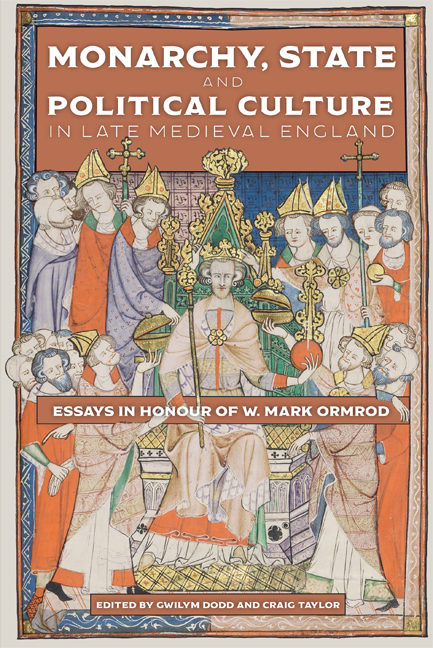Book contents
- Frontmatter
- Contents
- Frontispiece
- Preface and Acknowledgements
- Contributors
- Abbreviations
- Professor W. Mark Ormrod: A Personal Appreciation
- 1 The ‘Unfortunate’ Fraudster: Thomas de Boulton and the East Riding Lay Subsidy of 1332
- 2 Negotiating and Creating Collegiate Statutes in the Fourteenth Century
- 3 An Emotional Pragmatism: Edward III and Death
- 4 Defaming the King: Reporting Disloyal Speech in Fourteenth-Century England
- 5 Law and Arms: The Politics of Chivalry in Late Medieval England
- 6 ‘Nother by Addicions, Nother by Diminucions’: The Parliament of April 1414 and the Drafting of Late Medieval English Legislation
- 7 The Medieval ‘Side-Hustler’: Thomas Hoccleve’s Career in, and out of, the Privy Seal
- 8 The Order, Rules and Constructions of the House of the Most Excellent Princess Cecily, Duchess of York
- 9 Archbishops’ Registers Revealed: Church, State and Society in the Registers of the Archbishops of York, 1225–c.1650
- List of PhD Supervisees
- List of Grants
- Index
- Tabula Gratulatoria
9 - Archbishops’ Registers Revealed: Church, State and Society in the Registers of the Archbishops of York, 1225–c.1650
Published online by Cambridge University Press: 06 October 2020
- Frontmatter
- Contents
- Frontispiece
- Preface and Acknowledgements
- Contributors
- Abbreviations
- Professor W. Mark Ormrod: A Personal Appreciation
- 1 The ‘Unfortunate’ Fraudster: Thomas de Boulton and the East Riding Lay Subsidy of 1332
- 2 Negotiating and Creating Collegiate Statutes in the Fourteenth Century
- 3 An Emotional Pragmatism: Edward III and Death
- 4 Defaming the King: Reporting Disloyal Speech in Fourteenth-Century England
- 5 Law and Arms: The Politics of Chivalry in Late Medieval England
- 6 ‘Nother by Addicions, Nother by Diminucions’: The Parliament of April 1414 and the Drafting of Late Medieval English Legislation
- 7 The Medieval ‘Side-Hustler’: Thomas Hoccleve’s Career in, and out of, the Privy Seal
- 8 The Order, Rules and Constructions of the House of the Most Excellent Princess Cecily, Duchess of York
- 9 Archbishops’ Registers Revealed: Church, State and Society in the Registers of the Archbishops of York, 1225–c.1650
- List of PhD Supervisees
- List of Grants
- Index
- Tabula Gratulatoria
Summary
IN 2014, MARK ORMROD RECEIVED THE generous award of just under $300,000 from the Andrew W. Mellon Foundation for an ambitious and innovative new project, building on his enormous success in funding and managing similar initiatives such as the ‘Medieval Petitions’ project, and, more recently, the ‘England's Immigrants’ project, to say nothing of his involvement in ‘The Parliament Rolls of Medieval England’ (i.e. PROME) and the ‘Records of English and Welsh Lay and Clerical Taxation’ projects. This new grant was to enable digitisation of the extant registers of the archbishops of York, 1225–c.1650, held in the University of York's Borthwick Institute for Archives, and launch them online with a searchable index, making them freely available worldwide. Mark devised this project through his belief in the intrinsic value of this source and what it could reveal of the interaction between church, state and society during four hundred years and more of English history. As well as giving an outline of the project and how it has radically increased availability and facilitated access to the registers for a much wider audience than before, the discussion in this chapter demonstrates the possibilities for future research using examples mainly drawn from the fifteenth to the early seventeenth century registers.
The Registers
The registers of the archbishops of York – whether in roll format, such as the register of Walter de Gray, archbishop from 1215 to 1255, or as codices, like the register of William Melton, archbishop from 1317 to 1340 – all record the various types of business carried out by the archbishop or his officials within the province and diocese of York. Many entries found in the registers contain copies of documents issued in the name of the archbishop or received by him, including for instance those that throw light on relations with the monarchy. These include significations of excommunication, requests for invocation of the secular arm of the law in certain cases of contravention of ecclesiastical law and failure to come to that law, or simply prayers for the king's undertakings, particularly in wartime. Other entries highlight the intersection of the secular and spiritual worlds, most obviously in the matter of the taxation of the clergy which, although carried out separately from that of the laity until the mid-seventeenth century, nevertheless indicated the reach and power of the state.
- Type
- Chapter
- Information
- Monarchy, State and Political Culture in Late Medieval EnglandEssays in Honour of W. Mark Ormrod, pp. 188 - 209Publisher: Boydell & BrewerPrint publication year: 2020



